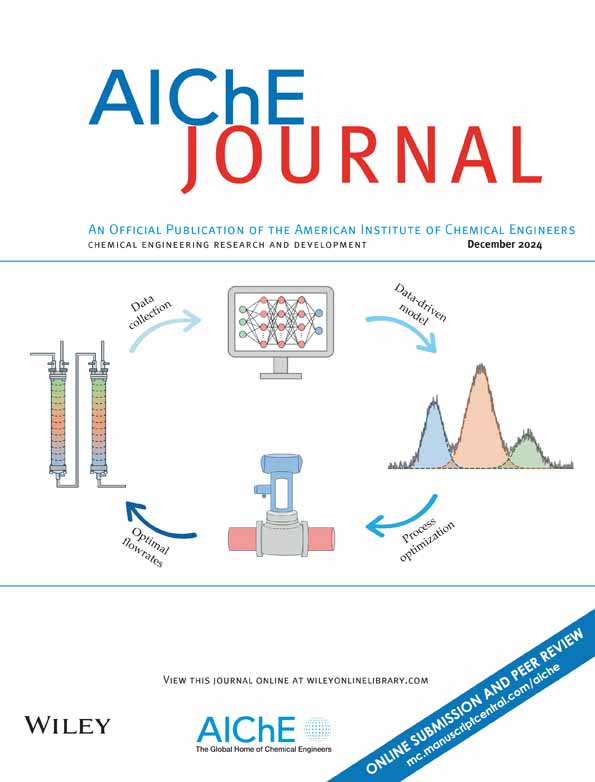Process monitoring and safety‐informed control of a proton exchange membrane water electrolysis system
IF 3.5
3区 工程技术
Q2 ENGINEERING, CHEMICAL
引用次数: 0
Abstract
This study provides an experimental validation of a multiple‐input multiple‐output (MIMO) model predictive control (MPC) strategy, coupled with dynamic risk modeling, to address two critical aspects of proton exchange membrane water electrolysis (PEMWE) operation: (i) process safety, by mitigating temperature imbalances, and (ii) system performance, through precise hydrogen production control. A cyber‐physical platform was developed for real‐time monitoring, state‐space modeling and validation, risk metrics analysis, control implementation, and visualization. Open‐loop experiments revealed limitations in managing thermal gradients, underscoring the need for feedback operating strategies. The proposed closed‐loop MPC approach achieved precise tracking of hydrogen production while maintaining safety by ensuring temperature stability. Moreover, the dynamic risk metrics show how thermal risk evolves with temperature and offer guidance for decision‐making. These findings demonstrate the effectiveness of MIMO MPC in enhancing the operational safety and efficiency of PEMWE systems, providing a foundation for scalable and sustainable hydrogen production.质子交换膜电解系统的过程监控和安全信息控制
本研究提供了多输入多输出(MIMO)模型预测控制(MPC)策略的实验验证,结合动态风险建模,解决质子交换膜电解(PEMWE)操作的两个关键方面:(i)过程安全,通过减轻温度不平衡;(ii)系统性能,通过精确的制氢控制。开发了一个网络物理平台,用于实时监控、状态空间建模和验证、风险度量分析、控制实施和可视化。开环实验揭示了热梯度管理的局限性,强调了反馈操作策略的必要性。所提出的闭环MPC方法实现了对氢气生产的精确跟踪,同时通过确保温度稳定性来保持安全性。此外,动态风险指标显示了热风险如何随温度变化,并为决策提供指导。这些发现证明了MIMO MPC在提高PEMWE系统的运行安全性和效率方面的有效性,为可扩展和可持续的氢气生产奠定了基础。
本文章由计算机程序翻译,如有差异,请以英文原文为准。
求助全文
约1分钟内获得全文
求助全文
来源期刊

AIChE Journal
工程技术-工程:化工
CiteScore
7.10
自引率
10.80%
发文量
411
审稿时长
3.6 months
期刊介绍:
The AIChE Journal is the premier research monthly in chemical engineering and related fields. This peer-reviewed and broad-based journal reports on the most important and latest technological advances in core areas of chemical engineering as well as in other relevant engineering disciplines. To keep abreast with the progressive outlook of the profession, the Journal has been expanding the scope of its editorial contents to include such fast developing areas as biotechnology, electrochemical engineering, and environmental engineering.
The AIChE Journal is indeed the global communications vehicle for the world-renowned researchers to exchange top-notch research findings with one another. Subscribing to the AIChE Journal is like having immediate access to nine topical journals in the field.
Articles are categorized according to the following topical areas:
Biomolecular Engineering, Bioengineering, Biochemicals, Biofuels, and Food
Inorganic Materials: Synthesis and Processing
Particle Technology and Fluidization
Process Systems Engineering
Reaction Engineering, Kinetics and Catalysis
Separations: Materials, Devices and Processes
Soft Materials: Synthesis, Processing and Products
Thermodynamics and Molecular-Scale Phenomena
Transport Phenomena and Fluid Mechanics.
 求助内容:
求助内容: 应助结果提醒方式:
应助结果提醒方式:


